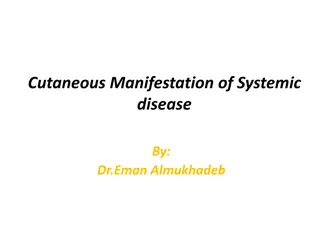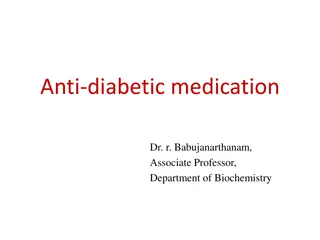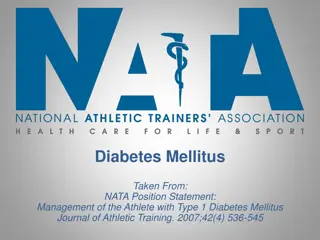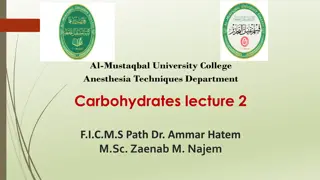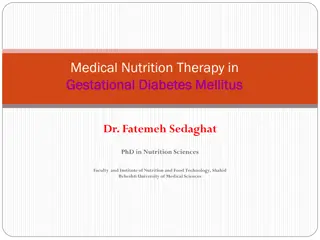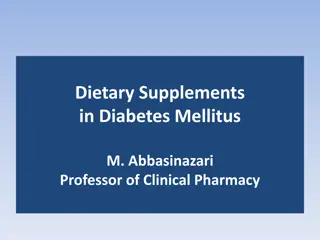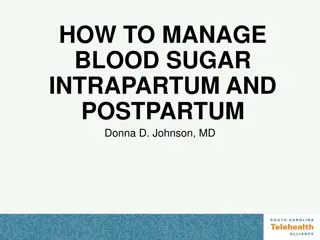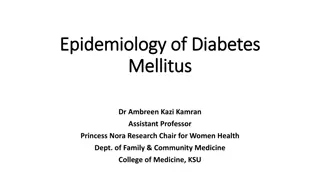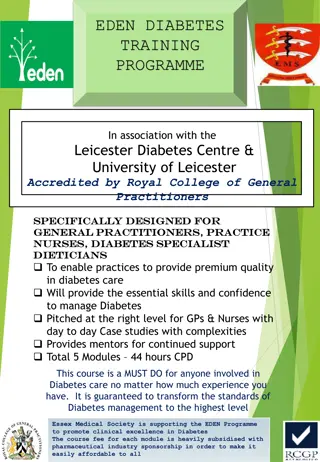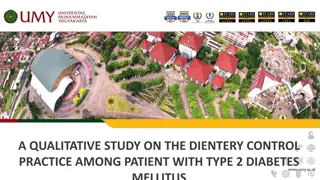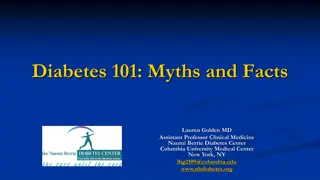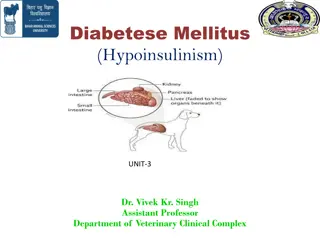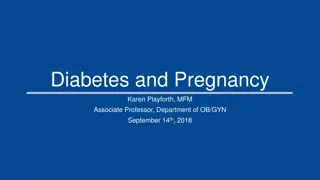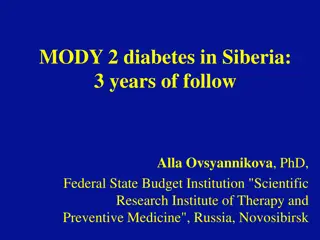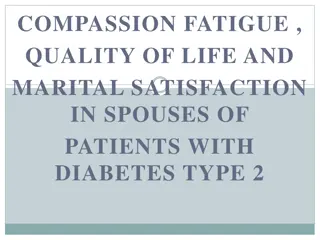Understanding the Relationship Between Mental Health and Diabetes: Insights for Educators
Exploring the link between mental health issues and diabetes, this presentation by Dr. Mary de Groot discusses the implications for diabetes educators. It delves into the prevalence of mental health conditions in people with diabetes, screening, treatment options, and interrelationships between diab
5 views • 45 slides
Lower Your Patients' Risk of Type 2 Diabetes with CDC's National DPP Lifestyle Change Program
Lower the risk of type 2 diabetes in your patients by implementing the CDC's National Diabetes Prevention Program (National DPP). This evidence-based lifestyle change program focuses on healthy eating and physical activity, helping participants make lasting changes to prevent or delay type 2 diabete
3 views • 11 slides
Dermatologic manifestations of diabetes mellitus.
The presentation slides discuss various dermatologic manifestations of diabetes mellitus, including acanthosis nigricans, diabetic dermopathy, acrochordons (skin tags), and necrobiosis lipoidica diabeticorum (NLD). Each feature description, location, mechanism, and treatment options are detailed alo
8 views • 10 slides
Cutaneous Manifestations of Systemic Diseases: Endocrine Disorders and Diabetes Mellitus
Explore the cutaneous manifestations of systemic diseases, particularly focusing on endocrine disorders like diabetes mellitus. Learn about the dermatologic signs associated with conditions such as hypothyroidism, hyperthyroidism, Addison's disease, and Cushing syndrome. Discover specific manifestat
0 views • 88 slides
Psychiatric Consultation for Diabetes: Enhancing Care at the Intersection of Mental and Physical Health
This presentation by Dr. James K. Rustad explores the critical role of consultation-liaison psychiatrists in managing diabetes along with mental health conditions like schizophrenia. It delves into the prevalence of diabetes, particularly among specific demographic groups, and highlights the complex
0 views • 35 slides
Senior Wellness Presentation: Managing Diabetes Through Exercise
Explore the benefits of exercise in managing diabetes for seniors, including tips on starting an exercise routine and preventing health issues associated with diabetes. Discover how exercise can improve insulin sensitivity and overall well-being for individuals with Type 2 Diabetes. The presentation
0 views • 14 slides
Overview of Anti-Diabetic Medication and Treatment Options
Anti-diabetic medications are used to treat diabetes by lowering glucose levels in the blood. There are various classes of drugs such as insulin, sensitizers, secretagogues, and more, each targeting different aspects of diabetes management. Type 1 diabetes requires insulin injections, while Type 2 d
0 views • 5 slides
Understanding Diabetes: Types, Causes, and Prevention
Diabetes is a disease that affects how the body uses glucose, the main source of fuel. There are two main types of diabetes – Type 1 and Type 2. In Type 1 diabetes, the pancreas fails to produce insulin, while in Type 2, the body's cells do not respond properly to insulin. Uncontrolled diabetes ca
1 views • 14 slides
Managing Diabetes in Pregnancy: Preconception and Post-conception Care
Providing preconception care for women with established type 1 or type 2 diabetes is crucial for ensuring a healthy pregnancy. This involves counseling on effective contraception, evaluating and treating diabetes-related complications, reviewing risks of uncontrolled diabetes during pregnancy, and d
0 views • 37 slides
Understanding Diabetes and Its Management in Students
Diabetes is a chronic condition characterized by high blood sugar levels. This article discusses the management and safety of students with diabetes, highlighting the types and classifications of diabetes, differences between Type 1 and Type 2 diabetes, and the presentations of diabetes. It emphasiz
1 views • 42 slides
Priorities and Quality Measures for Type 2 Diabetes Care in NHS GGC
Dr. Kashif Ali leads primary care for Type 2 diabetes, while Dr. James Boyle oversees secondary care in NHS GGC. The data from December 2018 shows the number of Type 2 diabetes patients, their care processes, HbA1c levels, and BMI status. The Diabetes Quality Improvement and Outcome Measures aim to
0 views • 27 slides
Diabetes Mellitus Type 1 Management Guidelines for Athletes
Diabetes Mellitus Type 1 is a chronic endocrine disorder characterized by hyperglycemia, absolute insulin deficiency, and autoimmune origins. This condition, more common among athletes, requires careful monitoring, insulin therapy, blood glucose management during exercise, and recognition of hypogly
0 views • 7 slides
Understanding Carbohydrate Metabolism and Diabetes Mellitus
Carbohydrates play a vital role in energy production through processes like glycolysis and gluconeogenesis. Glucose metabolism involves pathways like aerobic glycolysis and anaerobic lactate production. In diabetes mellitus, there is a disruption in carbohydrate metabolism leading to elevated blood
1 views • 14 slides
Comprehensive Guide to Diabetes Screening in Pregnancy
This comprehensive guide covers the screening, diagnosis, and management of diabetes in pregnancy, including gestational diabetes mellitus (GDM). It includes information on criteria for early prenatal diabetes testing, approaches for diagnosing GDM, and diagnostic criteria for oral glucose tolerance
0 views • 4 slides
Research Questions, Objectives, and Hypotheses in Diabetes Management
Explore the formulation of research questions, setting study objectives, and defining hypotheses in the context of diabetes mellitus management. Delve into the prevalence of diabetes in Saudi Arabia, glycemic control in diabetic patients, and addressing key research questions to reduce the impact of
0 views • 43 slides
Understanding Endocrine Emergencies and Diabetes Mellitus
The endocrine system plays a crucial role in regulating various bodily functions through hormone release. This presentation by Mrs. Bincy Cherian delves into endocrine emergencies, specifically focusing on Diabetes Mellitus. It explains the differences between Type I and Type II diabetes, their clin
3 views • 28 slides
Gestational Diabetes Mellitus: Overview and Risk Factors
Gestational Diabetes Mellitus (GDM) is defined as any level of glucose intolerance first detected during pregnancy, affecting approximately 7% of pregnancies globally. In Iran, GDM prevalence varies between 1.3% to 10%. Factors like age, BMI, weight gain, and family history influence GDM development
8 views • 50 slides
Understanding Dietary Supplements in Diabetes Mellitus
Explore the role of dietary supplements in managing diabetes mellitus, covering principles, complementary medicine, functional foods, history, regulations, and the definition of dietary supplements. Learn about the benefits and considerations of using supplements as a part of diabetes management.
0 views • 63 slides
Managing Blood Sugar Levels During Pregnancy and Postpartum
This helpful guide by Dr. Donna D. Johnson provides detailed insights on managing blood sugar levels for women with gestational diabetes mellitus (GDM), type 2 diabetes, and type 1 diabetes during pregnancy and postpartum. It covers medication adjustments, monitoring criteria, and specific recommend
0 views • 8 slides
Understanding Diabetes Mellitus and Dental Plaque
Diabetes mellitus is an endocrine disorder characterized by high blood glucose levels due to insufficient insulin production or ineffectiveness. Type 1 diabetes is insulin-dependent and typically develops in childhood, while Type 2 diabetes is non-insulin dependent and often seen in overweight adult
0 views • 13 slides
Exercise Prescription Certificate Course 2014/15 Session 4: Exercise Recommendations for Persons with Special Needs & Motivating Your Clients
This course session focuses on prescribing exercise for individuals with specific health conditions such as diabetes mellitus, hypertension, heart disease, osteoarthritis, and osteoporosis. It also covers strategies to motivate clients to adopt and maintain an exercise regimen, prevent exercise-rela
0 views • 99 slides
Understanding Gestational Diabetes Mellitus
Gestational Diabetes Mellitus (GDM) is a condition of glucose intolerance in pregnancy, characterized by hyperglycemia. It poses risks to both mother and baby, including macrosomia, birth trauma, neonatal complications, and long-term complications. The diagnosis of GDM involves criteria set by WHO i
0 views • 15 slides
Managing Diabetes: Dr. Hiren Patt’s Expert Advice for Mr. Patel
Dr. Hiren Patt, an Endocrinologist, guides a 24-year-old male named Mr. Patel through tests, diagnosis, and management of diabetes. The consultation covers understanding diabetes types, testing procedures, lifestyle changes, ideal weight recommendations, and dispelling myths about curing diabetes. D
0 views • 29 slides
Overview of Diabetes Mellitus: Types, Diagnosis, and Epidemiology
Diabetes Mellitus is a metabolic disorder characterized by chronic hyperglycemia. It includes Type 1, Type 2, Gestational, Secondary, and Pre-diabetes. Diagnosis involves symptoms like thirst, frequent urination, and weight loss, along with specific glucose tests. Understanding the types, diagnostic
0 views • 30 slides
Diabetes Audit 2017/18 Summary for Cambridgeshire and Peterborough CCG
The 2017/18 National Diabetes Audit for Cambridgeshire and Peterborough CCG reveals that 46,695 people are registered with diabetes in the region, with similar profiles to England. The audit shows disparities in diabetes registrations based on age and deprivation levels, and highlights improvements
0 views • 9 slides
Comprehensive Diabetes Training Programme for Healthcare Professionals
This accredited EDEN Diabetes Training Programme, supported by Essex Medical Society, offers essential skills and confidence to manage diabetes effectively. Specifically designed for GPs, nurses, and dieticians, the course covers a range of modules to elevate healthcare providers' ability in diabete
0 views • 4 slides
Comprehensive Overview of Rush Copley Outpatient Diabetes Center
The Rush Copley Outpatient Diabetes Center, led by Donna Carter RN, CDE, offers a rich history of diabetes treatment, from ancient practices to modern advancements. With a focus on patient education and management, the center serves various diabetes types and provides specialized care, including ins
0 views • 18 slides
Understanding Dietary Control Practices in Patients with Type 2 Diabetes Mellitus
This qualitative study explores dietary control practices among patients with type 2 diabetes mellitus. Conducted in Bantul, Yogyakarta, the research reveals challenges faced by individuals in managing their diet, particularly in avoiding fried foods and sugary drinks. Factors influencing blood gluc
0 views • 7 slides
Understanding Diabetes: Information for School Personnel
Diabetes is a condition where the body struggles to produce or utilize insulin effectively, leading to high blood sugar levels. This guide provides an overview of diabetes, differences between Type 1 and Type 2, managing diabetes, necessary supplies, and the needs of students with diabetes in a scho
0 views • 11 slides
Understanding Diabetes Mellitus: Causes, Effects, and Management
Diabetes Mellitus is a condition characterized by high blood sugar levels due to insufficient insulin production or utilization. It affects various organs and requires careful management through lifestyle changes, medication, or insulin therapy. While the exact causes are still being researched, fac
0 views • 18 slides
Debunking Common Myths About Diabetes
Diabetes can't be solely attributed to sugar consumption. Genetics and insulin resistance play significant roles. Understanding the criteria for diagnosing diabetes, pre-diabetes, and the importance of the Hemoglobin A1C test are crucial in managing the condition. This article sheds light on prevale
0 views • 18 slides
Understanding Diabetes Mellitus in Dogs: Causes, Symptoms, and Treatment
Diabetes mellitus is a common endocrine disorder in dogs, characterized by symptoms like polyuria, polyphagia, and cataract development. The etiology involves insulin deficiency and insulin resistance, leading to hyperglycemia and various clinical manifestations. Diagnosis is based on symptoms, glyc
0 views • 9 slides
Meeting the Challenge of Diabetes in China: Prevalence, Trends, and Geographic Variances
This comprehensive study examines the prevalence, trends, and geographic variances of diabetes in China compared to the United States. With a focus on diabetes and prediabetes rates, the analysis spans over two decades, highlighting the significant burden of the disease in the Chinese population. Th
0 views • 24 slides
Understanding Diabetes-Related Liver Diseases and Their Diagnostic Criteria
Explore the various liver diseases associated with diabetes, such as Glycogenic Hepatopathy, Diabetic Hepatosclerosis, and Hepatogenous Diabetes, along with their etiology, diagnosis, and management. Learn about rare conditions like Glycogenic Hepatopathy characterized by glycogen accumulation and h
0 views • 36 slides
Understanding Canine Diabetes Mellitus: Causes, Symptoms, and Treatment
Canine diabetes mellitus is a common disease in dogs, primarily affecting middle-aged and older dogs. Unlike Type 2 diabetes in humans, dogs mainly experience insulin-dependent Type 1 diabetes. The condition results from beta cell dysfunction in the pancreas, leading to insulin deficiency. Causes in
0 views • 32 slides
Diabetes and Pregnancy: Impact, Complications, and Management
This presentation delves into the potential impact of metabolic syndrome and diabetes on women's reproductive health. It covers topics such as preconception counseling for patients with preexisting diabetes mellitus, complications associated with poorly controlled diabetes in pregnancy, baseline eva
0 views • 31 slides
Understanding MODY Diabetes: Characteristics and Prevalence in Russia
Maturity-Onset Diabetes of the Young (MODY) is a monogenic form of diabetes that often manifests before the age of 25, with distinct clinical features and modes of inheritance. In Siberia, Russia, MODY prevalence and its various subtypes have been a subject of research, shedding light on its unique
0 views • 32 slides
Understanding Compassion Fatigue in Spouses of Type 2 Diabetes Patients
Compassion fatigue, a common phenomenon among spouses of individuals with type 2 diabetes, can impact quality of life and marital satisfaction. India faces a significant burden of diabetes, with a rising number of cases and high associated costs. The country also experiences an alarming trend of you
0 views • 26 slides
Protecting Against Flu: Education for People with Diabetes
Diabetes UK emphasizes the importance of influenza vaccination for individuals with diabetes to reduce the risk of severe complications. In the midst of the unique challenges posed by the 2020 flu season and the ongoing pandemic, efforts were made to increase awareness, encourage early vaccination a
0 views • 13 slides
Insights on Cardiometabolic Risk Reduction and Diabetes Treatment in 2019
Cardiologists in 2019 must address the significant cardiovascular risks associated with diabetes mellitus. Dr. Keith C. Ferdinand highlights the increased rates of heart disease, stroke, and heart failure in patients with diabetes. Despite advancements, cardiovascular risk management remains subopti
0 views • 10 slides



